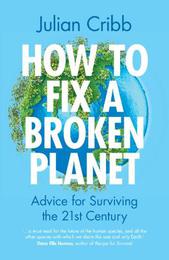
|
How to Fix a Broken Planet: Advice for Surviving the 21st Century
Paperback / softback
Main Details
Description
Do you want to help save human civilisation? If so, this book is for you. How to Fix a Broken Planet describes the ten catastrophic risks that menace human civilisation and our planet, and what we can all do to overcome or mitigate them. It explains what must be done globally to avert each megathreat, and what each of us can do in our own lives to help preserve a habitable world. It offers the first truly integrated world plan-of-action for a more sustainable human society - and fresh hope. A must-read for anyone seeking sound practical advice on what citizens, governments, companies, and community groups can do to safeguard our future.
Author Biography
Julian Cribb AM is an Australian author and science communicator. His career includes appointments as scientific editor for The Australian newspaper, director of national awareness for the Australian Commonwealth Scientific and Industrial Research Organisation (CSIRO), editor of several newspapers, member of numerous scientific boards and advisory panels, and president of national professional bodies for agricultural journalism and science communication. His published work includes over 9000 articles, 3000 science media releases and ten books. He has received thirty-two awards for journalism. His previous books include Earth Detox (2021), Food or War (2019), Poisoned Planet (2014), and The Coming Famine (2010). As a science writer and a grandparent, Julian Cribb is deeply concerned at the existential emergency facing humanity, and his latest books map hopeful pathways out of our predicament.
Reviews'Julian Cribb's pathbreaking new book, How to Fix a Broken Planet, looks squarely at the existential threats to our life-support systems and suggests how individuals and governments should take remedial action. I only hope people will read him and act.' Paul Ehrlich, author of The Annihilation of Nature '... probably the most important book I have read. I predict it will be a world changer. It needs to be translated into every language on Earth and made urgently available to politicians and community opinion leaders everywhere ... It offers the reader a sensible and practical path to rescue our human species from early extinction and offers detailed actions for individuals, community groups and governments.' Bob Douglas AO, Australian National University 'This book takes you on a chilling journey through the existential threats facing humanity. Essential reading for the 21st Century.' Will Steffen, Australian National University 'How to Fix a Broken Planet is a masterpiece that will have a lasting impact on the culture as people seek ways to be effective planetary citizens. This book delivers a worthy prescription for humanity to embrace common purpose. Together, in gender equal partnership, that's our best chance to save ourselves from ourselves' Geoff Holland, author of The Hydrogen Age 'How to Fix a Broken Planet is a must read for the future of the human species, and all the other species with which we share this one and only Earth.' Dana Hunnes, author of Recipe for Survival: What You Can Do to Live a Healthier and More Environmentally Friendly Life 'A blueprint for humanity surviving and thriving in the 21st century. This book provides the escape ramps for avoiding the dangerous problems facing our species.' Lyle Lewis, Former Endangered Species Biologist, U.S. Department of Interior 'Julian Cribb continues to warn all on this planet of what we are doing to it and the risks. As usual, his work is meticulously documented and tells us what can still be carried out - if the will is there at all levels.' John Kerin AO, Minister for Primary Industries and Energy in the Australian Hawke Government 1983-1991 '... nothing less than a luminous plan-of-action for a new human epoch which our grandchildren might not only survive but might flourish within, unleashing the glory of human creative potential, should we choose to fix our broken planet.' Gordon Weiss, World Food Programme's East Africa co-ordinator
|